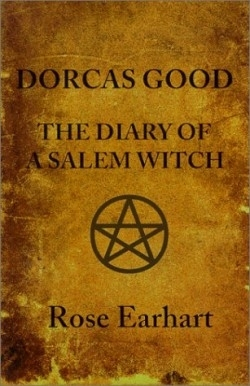Dorcas Good
The Diary of a Salem Witch
“I am no more a witch than you are a wizard, and if you take away my life, God will give you blood to drink!” Scaffolding abandoned and with feet swaying above the earth, the cries of accused witch Sarah Good were thought to be silenced. Good’s reedy words were not lost, however, with the bend of her neck—instead they breathe life into the brittle pages of the Salem records. Blending the noiseless horror of these factual documents with the immunity of historical fiction in Dorcas Good, Earhart attempts to return readers to the gnarled crest of Gallows Hill and the panic which coiled upon each Salem doorstep throughout the summer and autumn of 1692.
Employing her expertise in Salem history and the witch trials in particular, Earhart reanimates many key figures of the infamous witch hunt. Written primarily from the perspective of young Dorcas Good (daughter of accused witch Sarah Good) and in diary form, the novel allies the reader with the impoverished mother and child, recounting their progression from social outcasts to accused witches.
Following her drunken father’s extensive sexual and emotional abuse, Dorcas becomes the youngest of the accused during the Salem trials—affording a vicarious descent into the dark justices and dungeons of Salem, where inhuman tortures of the flesh and mind were mercilessly inflicted. Crude physical examinations for “the devil’s mark,” torturous assessment of pain threshold and her defilement by guards do not escape graphic detail. Consequently, hints of a shattered psyche emerge as the novel progresses, reflecting Earhart’s degree in psychology. “I cried to my dream friends to take me far away from the pain that seared through me…” A sub-plot develops, introducing a wayward pirate who has an interest in freeing Dorcas, which launches the novel briefly in the direction of pulp adventure before a rather phantasmagoric end.
By virtue of its numerous diary “entries,” the novel proceeds rapidly, as both action and pages pass without labored effort. Though perhaps beleaguered by disproportionate sequences of sexual brutality and somewhat fanciful plot departures, readers may enjoy the novel’s ample dialogue which lends to its winged pace. Earhart remains faithful to surviving historical documentation when needed, successfully weaving fact and authentic quotes into the narrator’s “account,” which should appeal to readers with an interest in and knowledge of the period.
The troubled eyes of Dorcas Good provide an uncommon vantage point from which readers may view a dark portrait of seventeenth century hysteria, stippled with traces of contemporary influence.
Reviewed by
Karen Wyckoff
Disclosure: This article is not an endorsement, but a review. The publisher of this book provided free copies of the book to have their book reviewed by a professional reviewer. No fee was paid by the publisher for this review. Foreword Reviews only recommends books that we love. Foreword Magazine, Inc. is disclosing this in accordance with the Federal Trade Commission’s 16 CFR, Part 255.

